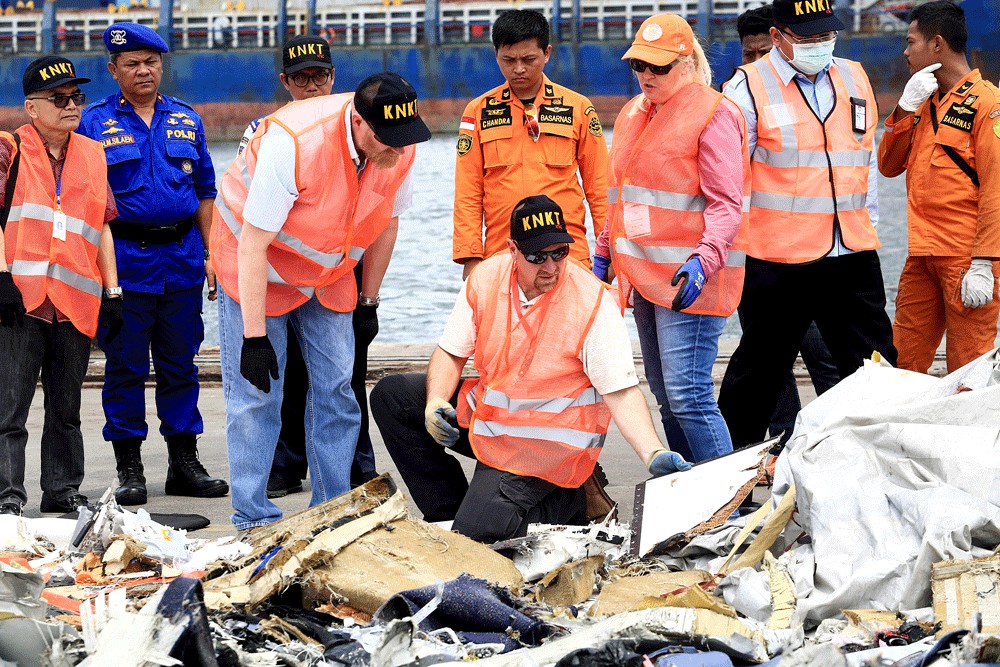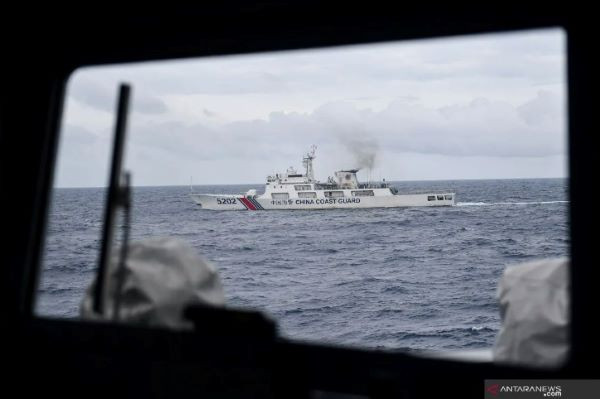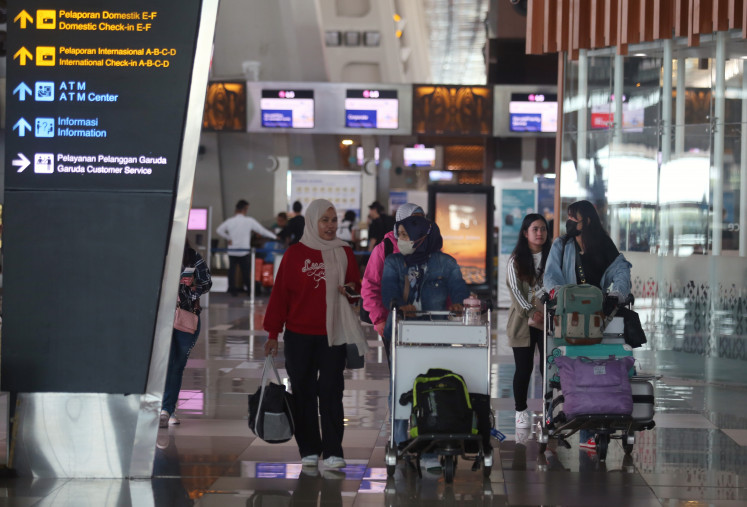Organizational failure of Lion Air and the loss of JT610
Lion Air had no risk management model, no contingency plan, no standard operating procedures. If they did have them, they existed only on paper.
Change Size
 Members of the United States National Transportation Safety Board analyze debris from Lion Air flight JT610 at Tanjung Priok Port in North Jakarta. (The Jakarta Post/Dhoni Setiawan)
Members of the United States National Transportation Safety Board analyze debris from Lion Air flight JT610 at Tanjung Priok Port in North Jakarta. (The Jakarta Post/Dhoni Setiawan)
T
he recent crash of Lion Air flight JT610 might be technical in nature, but is also a manifestation of that airline’s organizational failure. There’s no better place to explore this failure than with Lion’s logistical collapse during the February 2015 Chinese New Year holiday, which I unfortunately had unprecedented access to. In three days over 560 flights were delayed, and thousands of passengers stranded for 24 hours or more. Lion later claimed four planes taken out of service had a “domino effect” across their then fleet of 107 planes. This explanation was widely ridiculed.
I was scheduled to depart Jakarta at 5:05 a.m. on Feb. 16, 2015, and arrive in Tual in Maluku at1:50 p.m., transiting Ambon. This itinerary devolved into a 30-hour trip. Some unusual standard operating procedures became apparent from my experience.
No information is good information. I checked in for my 5:05 a.m. flight at 3:30 a.m., even though no plane was available: I confirmed this with Lion Air staff hours later. But no passengers were informed. At 5:30 a.m. Lion Air announced the plane would depart at 7 a.m. At 6:45 a.m. I asked the young worker manning the gate if the flight was still on schedule. “Yes,” he said. I wondered why he looked scared. I soon found out.
Workers are expendable, and managers are cowards. It turned out many of these passengers were supposed to depart the day before. And they began to snap. By 8 a.m. that young worker was trapped behind the customer service counter by a mob which only had one demand: to know what time their flights would leave. He keyed his radio, asking for information. And he keyed it. And he keyed it again. Nothing. He tried to use his mobile to call the operations center. No answer. At around 8:45 a.m., with passengers screaming and knocking over a computer terminal, he tried to flee and was assaulted. Some of the passengers kept his radio. I spoke to other customers as they milled around, angry: one woman was trying to reach her father’s funeral in Surabaya; she missed it. Eventually the abandoned operations office downstairs was looted.
If you can’t fix a problem, send it somewhere else. A plane was found to take us to Ambon! A new Lion Air worker said the plane would transit Surabaya, with no de-planning required. But in Surabaya we were hustled off the plane by stewards who assured us the next flight was in 45 minutes. In the airport, however, we discovered there was no Ambon-bound plane. While another mob besieged the transit desk, surrounding yet more young staff abandoned by their managers, I spoke to another Lion Air staff member who said there was never an Ambon-bound plane, and that Lion Air’s Jakarta tactic was to dissipate the concentration of enraged passengers to other airports. We were, to the airline, the mess that the mop pushed out the door.
How did I get all this information? By being nice. The grassroots staff were as decent as their managers were not. They were desperately improvising to arrange tickets and transfers. One worker told me that, when he was hired two years before, he had gone through two weeks of training: the newest hires received two days. He managed to get me a flight — not to Ambon, but to Makassar, South Sulawesi, which was at least closer. I asked him if I could write his managers telling them what an outstanding worker he is. “Don’t bother,” he said. “They don’t care.” Another worker told me she had been with Lion for two months and hated it, and she started to cry.
These young people were not anomalies in an otherwise content workforce. Are all Lion Air staff similarly under-trained and under-appreciated, including mechanics, inspectors, and crew? Such failures are indicative of other failures that simply haven’t seen the light of day. And if the responsible people leave, what does that say about the ones who stay and become managers?
Lion never adequately explained or took responsibility for the 2015 collapse. This failure is accepted: it starts at the top, with Rusdi and Kusnan Kirana, the brothers who implausibly claim that they pooled their money to buy a single plane in 2000 and built an aviation empire from it. The brothers are likely figureheads for a multitude of other unknown Indonesian investors.
The main lesson from 2015 was that, after 14 years of operations, and an unnaturally high delay and cancellation rate, Lion Air had no risk management model, no contingency plan, no standard operating procedures. If they did have them, they existed only on paper. This same organizational culture surely links to JT610, which will likely be explained as a technical failure. But it’s actually an organizational one, akin to the crash of Adam Air flight 574 in January 2007, and Valuejet Flight 592 in May 1996.
And I can’t escape the image of a crew of underpaid, under-trained, and under-appreciated mechanics that couldn’t get jobs with better airlines, fiddling with a manual and eventually allowing a plane to return to service with a faulty air speed indicator – four times -- the last flight bearing 189 souls blown apart in the sea off Karawang in West Java.
***
The writer is a research associate at the School of Oriental and African Studies, University of London. His work on Asia includes traveling across Indonesia.








